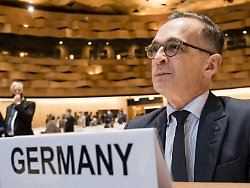Monday, September 13, 2021
Update
Only “pure emergency aid”
Maas pledges 100 million euros to Afghanistan
A humanitarian catastrophe threatens the people of Afghanistan. The Taliban’s takeover has made matters worse. Germany pledges 100 million euros at a UN donor conference. But there should only be more money under certain conditions.
In the face of an impending humanitarian catastrophe in Afghanistan, numerous countries have announced aid amounting to millions of euros for the country despite the Taliban’s takeover. With a commitment of 100 million euros in humanitarian aid, Germany is one of the top donors at a UN donor conference in Geneva. The USA promised the equivalent of 54 million euros, Switzerland 30 million euros.
In total, more than a billion dollars (846 million euros) was pledged. UN Secretary General Antonio Guterres announced the provisional amount before the end of the meeting in Geneva and spoke of a “quantum leap”. “This conference fully met my expectations in terms of solidarity with the people of Afghanistan,” said Guterres. How much of the billion dollars will go to the United Nations’ emergency aid budget for the coming months and how much will be made available in another form or later, Guterres could not say.
It is about humanitarian aid for the crisis country and the region, said Federal Foreign Minister Heiko Maas in Geneva. He also promised “another 500 million euros”. The funds are to be “brought to the people in Afghanistan primarily via the United Nations organizations (…),” said the minister before the donor conference on ARD. He is optimistic that this will also be possible under the Taliban now ruling in Afghanistan, even if “technical talks” are necessary with them. The minister had previously announced that any support for the country would not go beyond “pure emergency aid” for the population.
Taliban demand cooperation
“The Afghans need a lifeline” in order to survive their “hardest hour”, said UN Secretary General Guterres. He had called the donor conference and put the immediate need for aid at 606 million dollars (514 million euros). Almost a third of this need arose in connection with the Taliban’s takeover. The UN itself pledged $ 20 million from its emergency fund.
Afghanistan has been dependent on international aid for years. At the end of last year, the United Nations called for aid totaling 1.3 billion dollars. However, the corresponding pot is still severely underfunded. According to the UN, half of the children under five in Afghanistan are now threatened with hunger. Guterres called on the Taliban to let international aid workers work without harassment or intimidation. Previously, UN human rights chief Michelle Bachelet reported on increasing violence against UN employees on the ground.
The Taliban themselves called on the international community to cooperate. “The world should work with us,” said Taliban spokesman Sabiullah Mujahid of the German press agency. “Security in the country has been maintained and people are in economic trouble, food is scarce, medicine is scarce.” Mujahid promised security for aid organizations. “We offer them (the aid organizations) security and transparency, and we will not allow any corruption in the provision of aid and aid.” However, many countries want to make aid deliveries subject to conditions. Observers fear that the militant group, despite all hopes for a more moderate course, will again govern with a hard hand.
Help “make dependent on deeds”
“Beyond humanitarian aid, we will not make our future attitude towards a Taliban government dependent on its words, but rather on its actions,” Maas said at the conference in Geneva. Specifically, the new rulers would have to let people with protection status in Germany leave the country, respect “basic human rights”, and the country would no longer be allowed to become a refuge for international “terrorism”.
So far, however, the Taliban are still a long way from achieving this: “The formation of a transitional government to the exclusion of other groups last week was not the right signal for international cooperation,” said Maas. The cabinet presented by the Islamists consists exclusively of men who have been with the militia for many years. UN Human Rights Commissioner Bachelet was “disappointed” that no women and almost only members of the Pashtun ethnic group are represented.
The US demanded written commitments from the Taliban related to humanitarian aid. It is about the rights of aid organizations, women and minorities, said the UN ambassador to Washington, Linda Thomas-Greenfield, in Geneva. “Words are not enough. We have to see action,” she said. “Aid organizations cannot do their job if the Taliban do not adhere to these central obligations and humanitarian rules,” said Thomas-Greenfield on a video link.
The Federal Ministry of the Interior has meanwhile begun to issue acceptance letters for over 2000 human rights activists, artists, scientists, journalists and other potentially endangered people from Afghanistan. These people had been identified by the Foreign Office as particularly in need of protection, along with the former local members of the Bundeswehr and other German institutions. Last Friday the complete list with the names of human rights activists and other people in need of protection was sent by the Foreign Office to the Ministry of the Interior, said the spokesman for the Federal Ministry of the Interior, Steve Alter, in Berlin.
.
